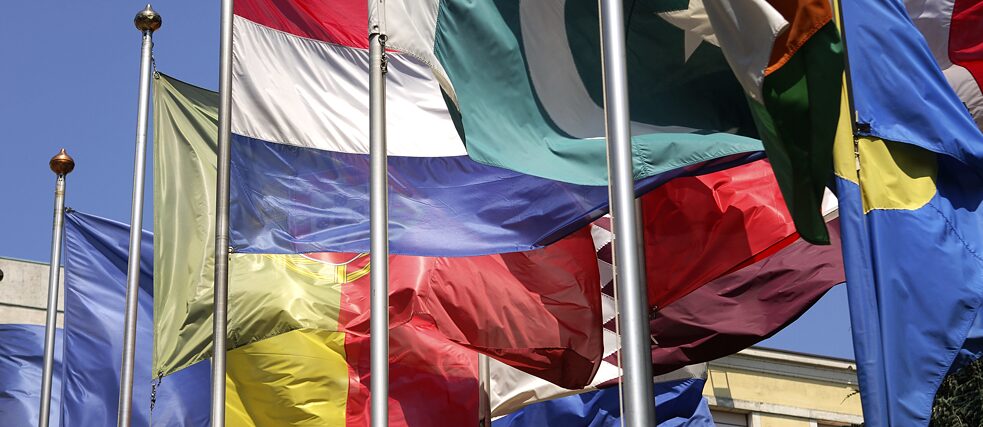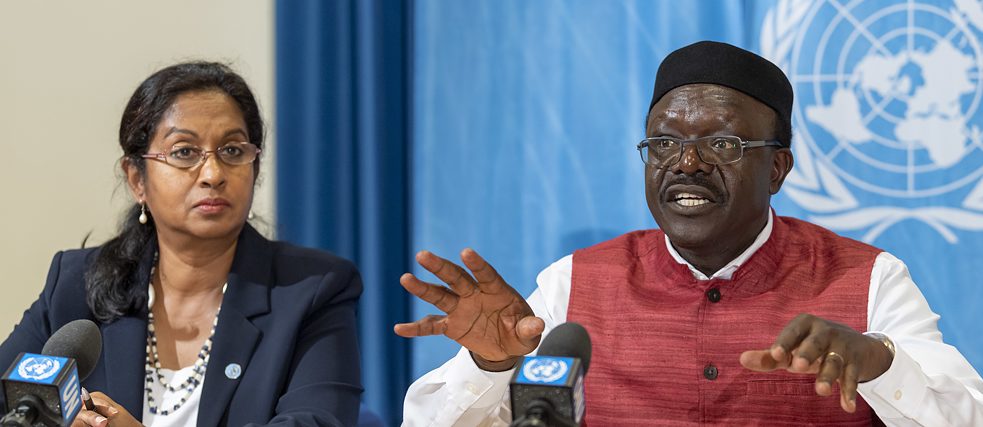Rethinking International Relations
How the Global South Can Protect Itself from Digital Exploitation

Not everyone benefits equally from the internet by a long way: the Global South gets exploited by American and Chinese digital platforms in particular. To rein in this dynamic, affected regions of the world should be able to apply tariffs or prioritise their own economies, experts are demanding.
By Maximilian Henning
Free trade on the internet is threatening to exacerbate global inequality. The Protestant NGO Brot für die Welt issued this warning in the recently published report “Gerechtigkeit 4.0” (Justice 4.0). To halt this development, developing and emerging nations should be able to impose duty on digital services or data storage exclusively within their own borders. Other than that, these countries ought to be encouraging their own digital industries as well as developing public infrastructures, write the authors.
The report goes on to say that it’s often mostly the international investors who are currently profiting from African start-ups. Furthermore groups operating globally earn more from digitised value chains than local businesses, plus the fact that data collection is frequently not protected and therefore puts the fundamental rights of citizens at risk.
Even the UN realises there’s a need for action
The fact that the digital revolution didn’t make everyone rich straight away was also identified by the United Nations Conference on Trade and Development (UNCTAD). “Wealth creation in the digital economy is highly concentrated in the United States and China, with the rest of the world, especially countries in Africa and Latin America, trailing considerably far behind,” according to a Digital Economy Report published by UNCTAD for 2018, the first one of its kind.
The UN report warns that “developing countries risk becoming mere providers of raw data, while having to pay for the digital intelligence generated using their data.” However, many of the countries affected don’t have a comprehensive strategy for dealing with the internet giants: “If left unaddressed, the yawning gap between the under-connected and the hyper-digitalized countries will widen, and inequalities be exacerbated.”
 Publication of the 2019 Digital Economic Report at the United Nations European Headquarters in Geneva, Switzerland: Shamika Sirimanne, left, UNCTAD Director of Technology and Logistics, and Mukhisa Kituyi, UNCTAD Secretary General | Photo (detail): Martial Trezzini/KEYSTONE © picture alliance
Publication of the 2019 Digital Economic Report at the United Nations European Headquarters in Geneva, Switzerland: Shamika Sirimanne, left, UNCTAD Director of Technology and Logistics, and Mukhisa Kituyi, UNCTAD Secretary General | Photo (detail): Martial Trezzini/KEYSTONE © picture alliance
Rich industrial nations want more
But rich industrial nations in particular are taking every opportunity to make things difficult for the Global South, where they are increasingly trying to make a stand against this exploitation. The stalemate as to which instruments may be used by structurally disadvantaged countries serves as a good indicator here – and how rich nations disregard attempts to at least ease this imbalance.
In this context, proposals were put forward in the run-up to the WTO Ministerial Conference in Buenos Aires 2017 by the USA and other industrial nations such as Japan and Singapore to bring in new and permanent legislation governing digital commerce. An international consensus may have been prevented by the massive resistance of many countries in the Global South – but a group of 76 WTO members is continuing negotiations amongst themselves, including heavyweights the USA, the EU and China.
Countries not involved in these discussions, such as India and South Africa, fear that ultimately various measures that they might need to protect their own digital industries would be permanently banned de facto. Many developing and emerging nations are currently exempt from some of the WTO rules: for example they are allowed to levy duty on physical goods such as books, even if they were purchased via online commercial platforms such as Amazon. Admittedly this exception does not apply if the goods are purely digital, ebooks for instance. Charging duty on these is not permitted – although the countries are allowed to decide every two years whether they want to retain this ban.
Now it is possible for this balance to go haywire. “While it used to be the case that only ebooks, music and certain services were considered to be electronic media, the number of products has increased hugely as a result of new technologies such as 3D printing,” it says in the Brot für die Welt report. If the ban on export tariffs for digital goods were to be permanently fixed, as demanded by “Freunde des E-Commerce”, then “developing countries would have to reckon with disproportionate losses because their budgets are still far more heavily dependent on customs revenue than they are in industrial countries.” So overall the poorer Global South would sacrifice even more scope to manoeuvre in order to defend themselves against discrimination and exploitation.
 Sven Hilbig, Consultant for World Trade at the organization "Brot für die Welt" (Bread for the World) | Photo (detail): Tobias Hase © dpa
Sven Hilbig, Consultant for World Trade at the organization "Brot für die Welt" (Bread for the World) | Photo (detail): Tobias Hase © dpa
Export tariffs, regulation, disclosure of source code
So Brot für die Welt is calling for “trade regulations applying to e-commerce, such as free data traffic and bans relating to localisation or taxation, to be dropped. They are undermining the independent development of countries in the Global South.”
As Sven Hilbig, global trade policy advisor for the NGO and one of the report’s authors, emphasises in an interview with netzpolitik.org, they are not talking about taxing internet access or the use of social media platforms. Laws of this kind, as seen for instance in Uganda or Zambia, limit access to the internet, especially for poor people. And as happens in Tanzania, where independent bloggers have to pay a prohibitively high licence fee, these laws often serve to suppress free expression of opinion. In financial terms they are not profitable either, because they inhibit the development of a digital economy.
Public instead of private infrastructure
And even without additional barriers, digitisation remains theoretical for many people: three-quarters of people in Southern Africa have no internet connection, write the Brot für die Welt authors. But: the countries cannot rely on the platforms removing the problem, for instance Facebook with its initiative internet.org and the severely restricted sub-internet service “Free Basics”. These platforms are chiefly interested in winning new customers and gaining their loyalty, so the study says.
Although Facebook – by means of satellites, drones and alliances with telecom companies – claims to have given 100 million people access to the internet, this is only a limited, restricted version, completely devoid of net neutrality. In India there was a huge campaign against Free Basics, the regulatory body for telecommunications banned the program. Free Basics was suspended in Egypt as well.
Collaboration with other countries
The Brot für die Welt report goes on to say that it’s “only in the form of a regional alliance that developing countries are in a position to build strong digital platforms that are also competitive on the international market.” Regional alliances, for instance in Africa that might be the West African economic community ECOWAS, which wants to introduce a shared currency from next year.
However this collaboration for example is being specifically obstructed by the EU, says Hilbig. The fact is that when the EU negotiates trade agreements, it does so with individual countries. “It’s as if they’re driving a wedge into the economic community,” says Hilbig. A similar example would be if the USA were to talk just to Italy or Germany rather than to the EU.
There is a growing need to establish and implement competition law within a regional or global framework. Individual countries, even industrial nations, do not have the legal or economic power to deal with global digital corporations.
Kenya, a country with a large domestic digital industry, announced in July that such a policy was being considered: the introduction of a tax on digital transactions, similar to the French digital tax. The answer came promptly – taxes on digital platforms could lead to an international trade war, said a Google spokesperson.